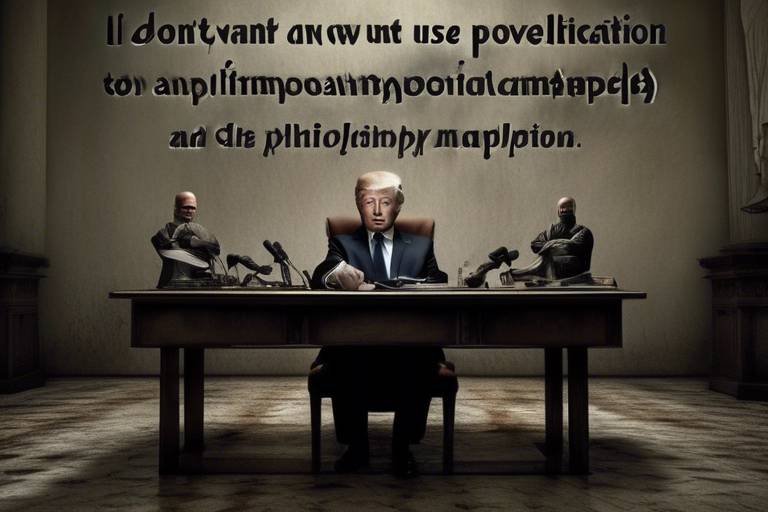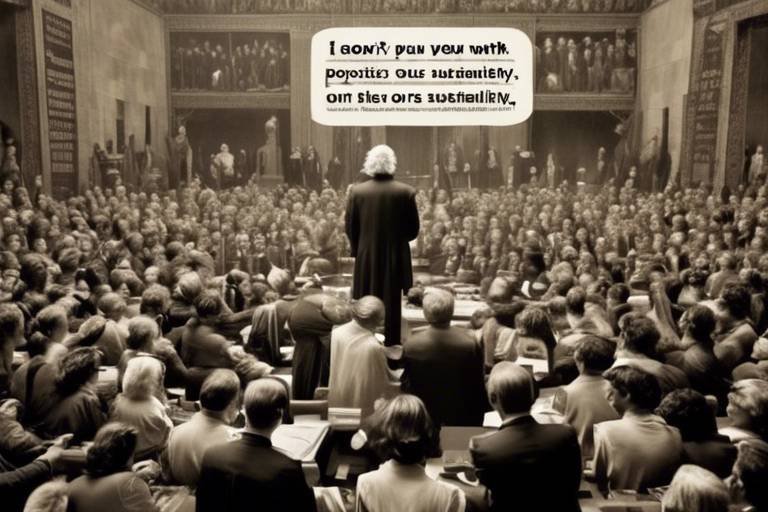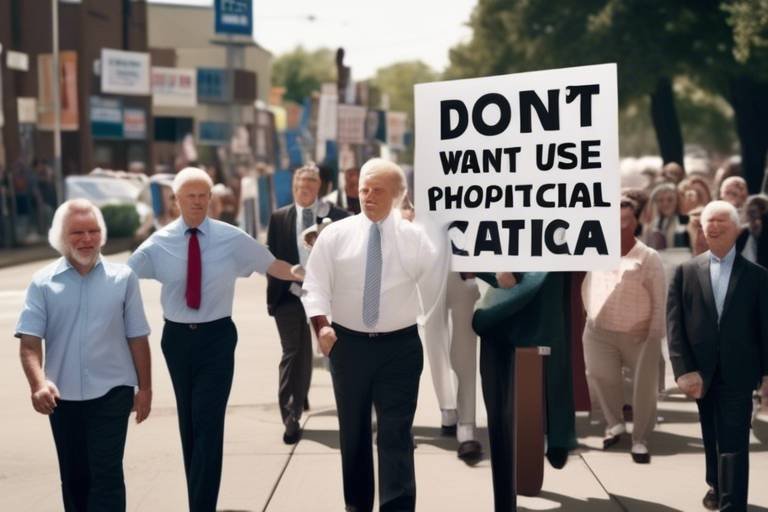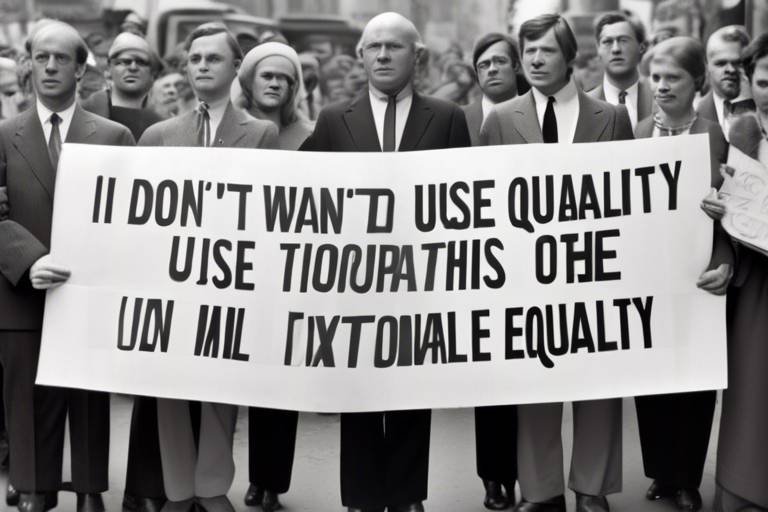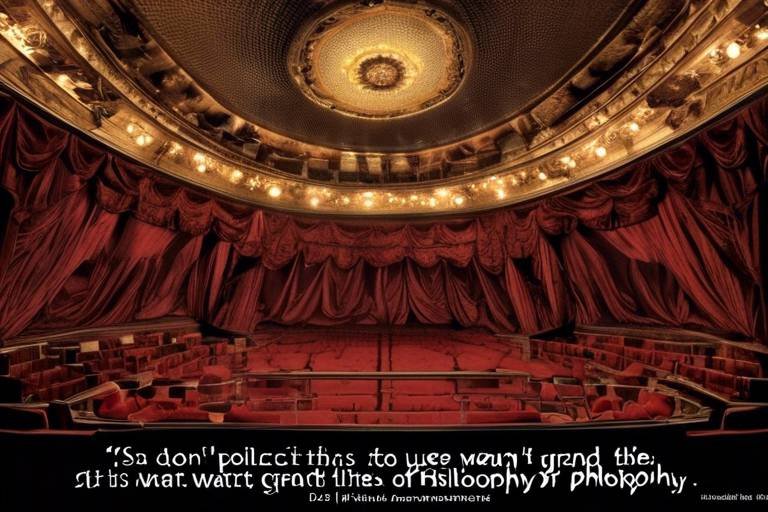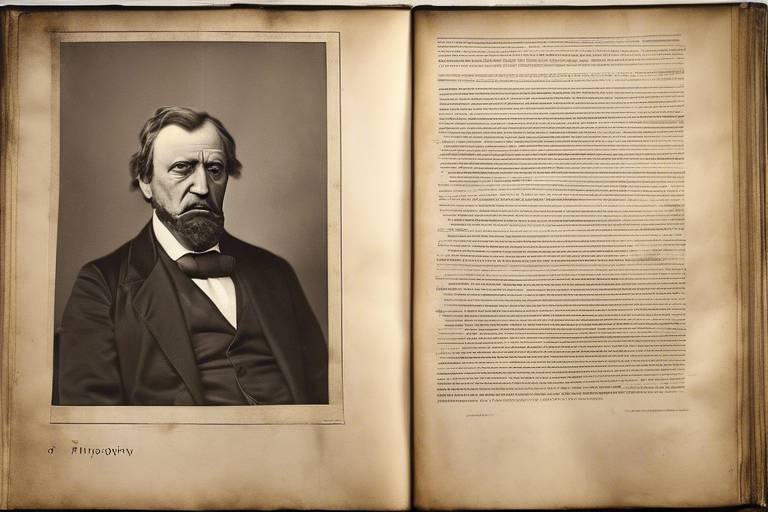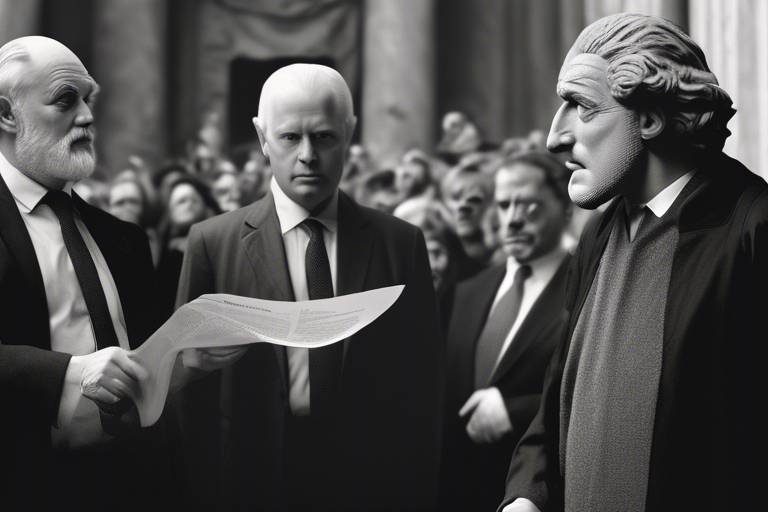The Philosophy of Power and Political Manipulation
The intricate dance between power and political manipulation is a captivating subject that has fascinated scholars, politicians, and everyday citizens alike. At its core, this relationship is not just about who holds power but also about how that power is wielded and the consequences it has on society. Just imagine power as a double-edged sword; it can create order and stability, yet it can also lead to chaos and oppression. The exploration of this philosophy invites us to ponder some significant questions: What defines power? How do those in power manipulate others? And what historical lessons can we learn to navigate contemporary political landscapes?
Understanding the nature of power is essential for anyone looking to grasp the complexities of political manipulation. Power can be defined in numerous ways; it can be coercive, persuasive, or even inspirational. Each type influences human behavior differently, shaping societal interactions and relationships. For instance, coercive power might compel individuals to act against their will, while inspirational power can motivate people to rally behind a cause. This dynamic interplay of power types creates a fertile ground for manipulation, where leaders can exploit these influences to sway public opinion and maintain control.
Throughout history, political manipulation has woven itself into the very fabric of governance. From ancient empires to modern democracies, leaders have employed various strategies to manipulate the masses. Take, for example, the Roman Empire, where emperors utilized grand spectacles and propaganda to distract citizens from governmental failures. This manipulation was not merely about maintaining authority; it was also about crafting a narrative that would keep the populace engaged and loyal. Similarly, the intertwining of religion and politics has shown how deeply entrenched beliefs can be weaponized to manipulate power dynamics. By aligning political agendas with religious doctrines, leaders have historically garnered support and justified their actions.
In contemporary society, the techniques of political manipulation have evolved, becoming more sophisticated and often insidious. The rise of digital media has transformed how information is disseminated, allowing for rapid spread of misinformation and targeted psychological tactics. Political entities now harness the power of social media to shape narratives, influence public perception, and even sway electoral outcomes. This modern landscape raises ethical questions about the responsibility of both leaders and citizens in discerning truth from manipulation.
As we delve deeper into the philosophical theories surrounding power, it becomes evident that understanding the ethical implications of political manipulation is crucial. Philosophers have long debated the morality of using manipulation to achieve political ends. For instance, utilitarianism presents a compelling argument: if manipulating public opinion leads to the greatest good for the greatest number, can it be justified? This perspective challenges us to consider the broader consequences of our political actions and the moral responsibilities that come with power.
Moreover, the theories of Michel Foucault revolutionize our understanding of power dynamics. Foucault posits that power is not merely held by individuals or institutions but is dispersed throughout society, embedded in our knowledge, language, and social practices. This view encourages us to critically analyze how power operates in our everyday lives and the subtle forms of manipulation that can occur without our awareness. Recognizing these dynamics empowers us to question authority and seek accountability in our leaders.
- What is political manipulation? Political manipulation refers to the strategies and tactics used by leaders to influence public opinion, control narratives, and maintain power.
- How has political manipulation changed over time? While the fundamental principles of manipulation remain, modern techniques leverage technology and media to spread misinformation and shape perceptions more effectively.
- What role does ethics play in political power? Ethics are crucial in evaluating the morality of political actions, particularly when manipulation is involved. Philosophical theories like utilitarianism help assess the implications of these actions.
- How can citizens protect themselves from manipulation? Staying informed, questioning sources of information, and engaging in critical thinking are essential strategies for individuals to safeguard against manipulation.

The Nature of Power
Understanding power is essential to grasp political manipulation. Power is often viewed as the ability to influence or control the behavior of people, and it manifests in various forms across different contexts. It can be tangible, like the authority held by a government, or intangible, such as the influence of public opinion. The dynamics of power are complex and multifaceted, intertwining with human behavior and societal interactions in ways that can be both overt and subtle.
At its core, power can be categorized into several types:
- Coercive Power: This type of power relies on force or threats to achieve compliance. Think of a bully on the playground; their power comes from intimidation.
- Reward Power: Here, power is based on the ability to distribute rewards. A manager who can give promotions holds reward power over their employees.
- Legitimate Power: This form stems from a position of authority. For instance, a police officer has legitimate power due to their role in society.
- Expert Power: This type arises from possessing knowledge or skills that others do not. A doctor holds expert power in medical situations.
- Referent Power: This is based on the personal traits of an individual, such as charisma or likability. Celebrities often wield referent power among their fans.
These types of power play a crucial role in shaping political landscapes. Political leaders often navigate these dynamics to achieve their goals, sometimes resorting to manipulation to maintain or enhance their power. The influence of power extends beyond the political arena; it seeps into our everyday lives, affecting how we interact with one another, make decisions, and perceive authority. The question arises: can power ever be wielded ethically?
As we delve deeper into the nature of power, it becomes evident that it is not merely about domination or control. Power can also be a tool for positive change. For instance, leaders who use their power to enact social justice or promote equality are exercising power in a way that benefits society as a whole. This duality of power raises profound ethical questions about its use and the responsibilities that come with it.
In contemporary politics, the nature of power has evolved significantly. The rise of technology and social media has transformed how power is distributed and exercised. Political figures can now reach millions with a single tweet or post, amplifying their influence in unprecedented ways. However, this also opens the door to manipulation through misinformation and propaganda, leading to a more complex landscape where the boundaries of truth become blurred.
In conclusion, the nature of power is intricate and multifaceted, encompassing both the potential for manipulation and the possibility for positive transformation. As we explore the historical perspectives and philosophical theories surrounding power, we gain a deeper understanding of its implications for society. This journey through the nature of power not only informs our understanding of political manipulation but also challenges us to consider the ethical dimensions of power in our own lives.

Historical Perspectives on Political Manipulation
Political manipulation is not a modern phenomenon; it has deep historical roots that have shaped the very fabric of societies across the globe. From ancient civilizations to contemporary governance, leaders have employed various strategies to influence public opinion and maintain control. Understanding these historical perspectives can provide invaluable insights into the dynamics of power today. Throughout history, we can observe a myriad of examples that illustrate how manipulation has been wielded as a tool of governance, often leading to significant societal changes.
One of the earliest instances of political manipulation can be traced back to ancient Egypt, where pharaohs would often utilize grand monuments and elaborate rituals to reinforce their divine right to rule. These public displays not only served to awe the populace but also to instill a sense of loyalty and reverence among the people. Similarly, in ancient Greece, political orators like Demosthenes and Cicero mastered the art of rhetoric, using persuasive speech to sway public opinion and manipulate political outcomes. Their ability to harness the power of language highlights how communication has always been a potent tool in the arsenal of political leaders.
When we delve deeper into ancient politics, we find rich examples that showcase the sophisticated techniques of manipulation employed by leaders. The Roman Empire, for instance, is a prime example of how emperors utilized various strategies to maintain authority and control over their vast territories. Propaganda played a crucial role in shaping public perception. Emperors like Augustus understood the importance of portraying themselves as benevolent rulers, often commissioning art and literature that celebrated their achievements while conveniently omitting their failures. This manipulation of public perception was not merely about self-aggrandizement; it was essential for maintaining stability in an empire that was constantly under threat from both external enemies and internal dissent.
The Roman Empire showcased sophisticated manipulation techniques that resonate even in modern political discourse. Public spectacles, such as gladiatorial games and elaborate festivals, served a dual purpose: to entertain the masses and to distract them from pressing issues like economic instability or military failures. These events created a sense of unity and loyalty among the citizens, effectively diverting their attention from the darker realities of governance. In this way, the emperors of Rome demonstrated an acute awareness of the psychological aspects of power, leveraging entertainment as a means of control.
Religion has often intertwined with politics, serving as both a source of moral authority and a tool for manipulation. Throughout history, religious leaders have wielded significant influence over political matters, guiding the beliefs and behaviors of their followers. For example, during the Middle Ages, the Catholic Church held immense power, often dictating the actions of kings and emperors. The intertwining of religious doctrine and political authority created a landscape where manipulation thrived. Leaders would invoke divine favor to legitimize their rule, while dissenters were often branded as heretics, effectively silencing opposition.
In conclusion, the historical perspectives on political manipulation reveal a complex tapestry of strategies employed by leaders to influence and control the masses. From ancient Egypt to the Roman Empire and beyond, the manipulation of public perception has been a vital aspect of governance. Understanding these historical contexts allows us to better grasp the nature of political manipulation in contemporary society, where similar tactics continue to shape the political landscape.
- What is political manipulation? Political manipulation refers to the strategic use of tactics by leaders to influence public opinion and maintain control, often at the expense of transparency and truth.
- How has political manipulation evolved over time? Political manipulation has evolved from ancient techniques, such as propaganda and public spectacles, to modern methods that include media influence and misinformation.
- Why is it important to study historical perspectives on political manipulation? Studying historical perspectives provides insights into the strategies that have shaped societies and helps us understand the ongoing dynamics of power in contemporary politics.
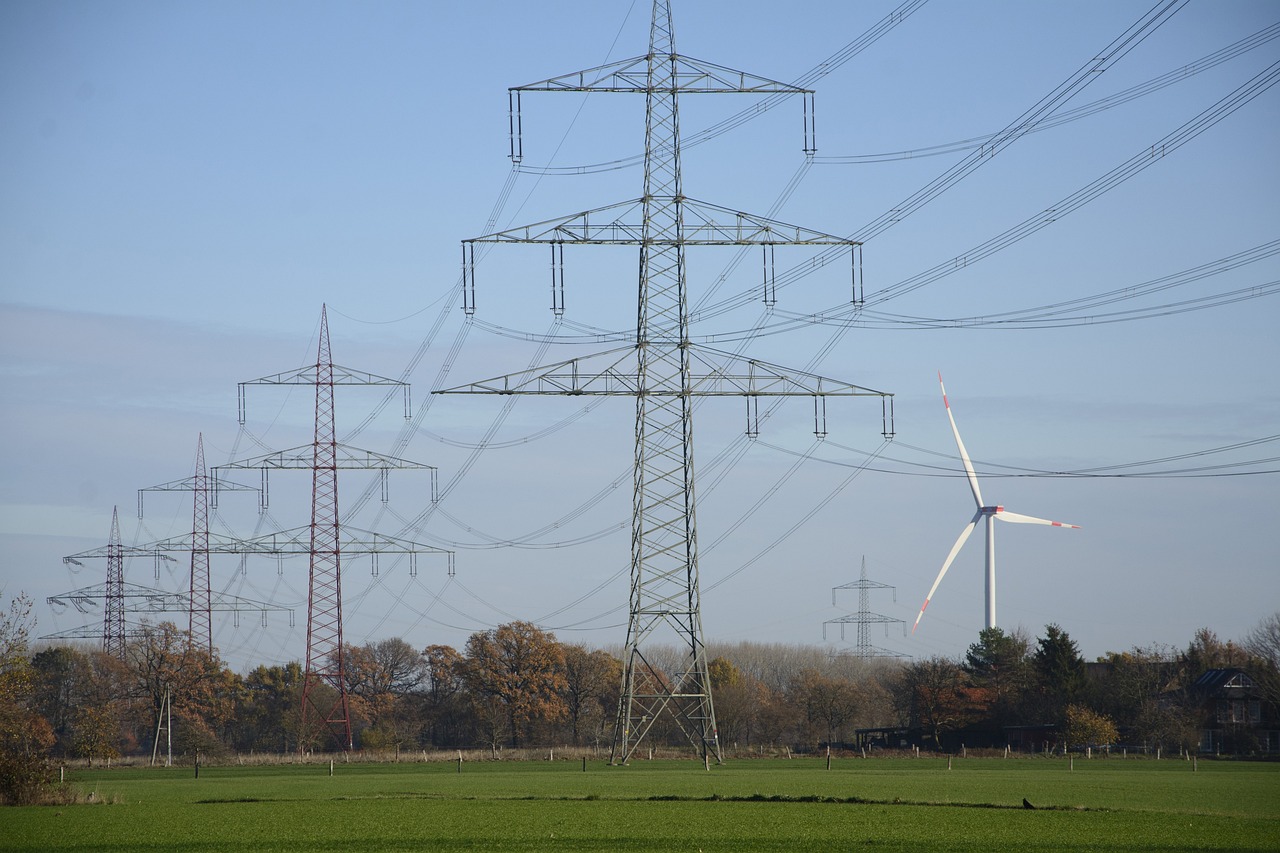
Case Studies in Ancient Politics
When we look back at ancient civilizations, we find a treasure trove of examples that illustrate the intricate dance of power and manipulation. These case studies not only reveal the strategies employed by leaders but also highlight the profound impact these tactics had on their societies. One of the most compelling examples comes from ancient Rome, where emperors like Augustus and Nero mastered the art of political manipulation to solidify their reigns.
Augustus, the first Roman emperor, understood that perception was everything. He cleverly crafted his image as a benevolent leader, often portraying himself as the restorer of the Republic, even while he consolidated power. Through a mix of propaganda and public works, he manipulated public opinion by emphasizing his contributions to peace and stability, known as the Pax Romana. His use of coinage as a medium for propaganda is particularly noteworthy. By minting coins that depicted his likeness and accomplishments, he ensured that his image was circulated widely, reinforcing his authority in the minds of the populace.
Nero, on the other hand, presents a different case. His reign was marked by extravagance and a blatant disregard for traditional Roman values. To divert attention from his failures, such as the Great Fire of Rome in 64 AD, he shifted the blame onto the Christians, employing a mix of fear and scapegoating to manipulate public sentiment. This tactic not only deflected criticism but also allowed him to consolidate power by rallying the public against a common enemy. The resulting persecution of Christians serves as a stark reminder of how political manipulation can lead to devastating consequences for marginalized groups.
Beyond Rome, we can also examine the role of religion in ancient politics. In Egypt, for instance, the Pharaohs were considered divine beings, a manipulation of belief that allowed them to wield absolute power. By intertwining governance with religious authority, they ensured that dissent was not only politically dangerous but also sacrilegious. This manipulation of faith created a societal structure where questioning the Pharaoh was akin to questioning the gods themselves, effectively stifling opposition.
These historical examples illustrate that political manipulation is not a modern phenomenon; it has deep roots in our past. The techniques employed by ancient leaders resonate today, reminding us that the struggle for power often involves a careful orchestration of public perception, fear, and belief. As we analyze these case studies, we begin to understand that the essence of political manipulation lies in its ability to shape narratives, control information, and influence behavior, a lesson that remains relevant in our contemporary political landscape.
- What is political manipulation? Political manipulation refers to the strategic use of influence, persuasion, or deception to control or sway public opinion and behavior in favor of a particular agenda or leader.
- How did ancient leaders manipulate their societies? Ancient leaders used various tactics, including propaganda, religious authority, and scapegoating, to shape public perception and maintain control over their subjects.
- Are there modern examples of political manipulation? Yes, contemporary politics often employs media influence, misinformation, and psychological tactics to manipulate public opinion and achieve specific goals.

Manipulation in the Roman Empire
The Roman Empire, a colossal entity that dominated much of the ancient world, was not just a marvel of military might and architectural grandeur; it was also a masterclass in political manipulation. Emperors and political leaders wielded power with a finesse that would make even the most seasoned modern politician envious. They understood that to maintain control, they had to not only govern but also shape the perceptions and beliefs of their citizens. This manipulation took various forms, from propaganda to public spectacles, all designed to create a favorable image of the ruling class while diverting attention from their shortcomings.
One of the most striking techniques employed was the use of public spectacles. Gladiatorial games and chariot races were not merely entertainment; they were tools for distraction. While the populace was engrossed in the excitement of the arena, they were less likely to question the political decisions being made behind closed doors. The phrase "bread and circuses" encapsulates this strategy perfectly; as long as the people were fed and entertained, they were less inclined to revolt or even voice dissent. This tactic highlights a crucial aspect of political manipulation: the ability to keep the masses satisfied and distracted while consolidating power.
Additionally, propaganda played a vital role in shaping public opinion. Emperors like Augustus understood the importance of a favorable image. He commissioned literature, art, and monuments that glorified his reign and depicted him as a benevolent ruler. For instance, the Aeneid, written by Virgil, was not just a literary masterpiece but a political tool that linked Augustus to the divine and portrayed his rule as a fulfillment of destiny. This manipulation of narrative through art and literature created a mythos around the emperor, fostering loyalty and admiration among the citizens.
Furthermore, the Roman Empire adeptly utilized religion as a means of manipulation. The emperors often positioned themselves as divine or semi-divine figures, demanding worship and allegiance. This intertwining of religion and politics served to legitimize their authority and suppress dissent. By claiming divine favor, rulers could manipulate the populace into believing that their political decisions were not just practical but also ordained by the gods. This tactic ensured that any opposition was not only a challenge to the emperor but also a challenge to the divine order itself.
In conclusion, the manipulation in the Roman Empire was a sophisticated blend of distraction, propaganda, and religious authority. These strategies not only helped emperors maintain power but also left a lasting legacy on the nature of political control. By studying these ancient techniques, we can gain valuable insights into the ongoing dynamics of power and manipulation in contemporary politics.
- What were the main methods of manipulation used by Roman emperors?
Roman emperors primarily used public spectacles, propaganda, and religious authority to manipulate public opinion and maintain control over the populace.
- How did propaganda influence the perception of emperors in ancient Rome?
Propaganda, through literature and art, helped create a favorable image of emperors, portraying them as benevolent and divinely sanctioned rulers.
- What role did religion play in political manipulation in the Roman Empire?
Religion was used to legitimize the authority of emperors, as they often positioned themselves as divine figures, making opposition not just a political challenge but a spiritual one as well.

The Role of Religion in Politics
Religion has long been a powerful force in shaping political landscapes across the globe. Its influence can be seen in various forms, from the moral foundations it provides to the laws and regulations governing societies. In many instances, religious beliefs have been manipulated to serve political agendas, creating a complex interplay between faith and governance. This relationship raises intriguing questions: How does religion shape political power? And conversely, how do political entities exploit religious sentiments to maintain control?
One of the most striking examples of religion's role in politics is the way it has been used to legitimize authority. Throughout history, leaders have often claimed divine sanction to reinforce their power. For instance, monarchs in medieval Europe frequently asserted that their right to rule was ordained by God, a concept known as the "Divine Right of Kings." This belief not only provided a moral justification for their reign but also discouraged rebellion, as opposing the king was seen as opposing divine will.
In addition to legitimizing authority, religion can also serve as a unifying force within a society. Shared beliefs and values can foster a sense of community and identity among followers. However, this unity can easily be manipulated. Political leaders may exploit religious sentiments, rallying people around a common cause or ideology. For example, during times of crisis, leaders might invoke religious rhetoric to galvanize support, framing political issues in moral terms that resonate deeply with the populace.
Moreover, the intertwining of religion and politics can lead to significant social consequences. In some cases, religious groups may gain substantial political power, influencing legislation and public policy. This can manifest in various ways, such as the promotion of laws that align with specific religious doctrines, which may not necessarily reflect the views of the broader population. Such scenarios raise ethical questions about the separation of church and state, and whether it is appropriate for religious beliefs to dictate political decisions.
The manipulation of religion in politics is not limited to historical contexts; it remains relevant today. Political campaigns often utilize religious language and symbols to appeal to voters. Candidates may position themselves as champions of particular faiths, thereby gaining the trust of religious communities. This strategy can be particularly effective in regions where religion plays a central role in daily life, as it creates a perception of shared values and goals.
However, this manipulation can also backfire. When political entities are perceived as exploiting religion for personal gain, it can lead to disillusionment among followers. People may begin to question the authenticity of their leaders, leading to a decline in trust and an increase in political apathy. Thus, the delicate balance between religion and politics must be navigated carefully, as it can significantly influence public opinion and societal cohesion.
In conclusion, the role of religion in politics is a multifaceted phenomenon that has evolved over time. From legitimizing authority to unifying communities, religion has been both a source of strength and a tool for manipulation. As we continue to witness the interplay between faith and governance in contemporary society, it is crucial to remain vigilant and critically assess how these dynamics shape our political landscape.
- How has religion historically influenced political power?
Religion has been used to legitimize authority and create a moral framework for governance, often leading to the consolidation of power among leaders who claim divine support.
- What are some modern examples of political manipulation using religion?
Contemporary political campaigns frequently employ religious rhetoric to connect with voters, often framing issues in moral terms to garner support.
- Can the intertwining of religion and politics lead to social unrest?
Yes, when political leaders exploit religious sentiments, it can lead to disillusionment and a decline in trust, potentially resulting in social unrest and political apathy.

Modern Political Manipulation Techniques
In today's fast-paced world, the landscape of politics has transformed dramatically, largely due to the rise of technology and social media. Modern political manipulation techniques are not just about the traditional means of persuasion; they have evolved into sophisticated strategies that can sway public opinion, create narratives, and even alter the course of elections. At the heart of these techniques lies the ability to harness information and misinformation, making the manipulation of facts a central tool for political entities.
One of the most prevalent methods of manipulation today is through media influence. Politicians and their teams meticulously craft messages that resonate with their target audiences. By using data analytics, they can identify the concerns and aspirations of different demographic groups, allowing for highly tailored campaigns. This approach is akin to a chef adjusting a recipe to suit the tastes of their diners—understanding what flavors will appeal most can make all the difference.
Moreover, the advent of social media has given rise to a new form of political engagement, but it has also opened the floodgates for misinformation. False narratives can spread like wildfire, often faster than the truth can catch up. This manipulation is not just about lying; it’s about creating a perception that can lead to real-world consequences. For instance, during elections, fabricated news stories can shape voter opinions and sway results. A recent study highlighted that 70% of people encounter misinformation on social media platforms, which raises serious questions about the integrity of information and its impact on democracy.
Another crucial aspect of modern political manipulation involves psychological tactics. Political campaigns now employ behavioral psychology to predict how voters will react to certain stimuli. Techniques such as fear-mongering, emotional appeals, and even social proof are strategically utilized to influence decisions. For example, a campaign might highlight the dangers of a particular policy by presenting it in a way that evokes fear, thereby pushing voters towards a desired outcome. This approach can be likened to a magician's sleight of hand; while the audience is distracted by one thing, the real trick is happening elsewhere.
To illustrate these techniques further, consider the following table that outlines some of the most common modern political manipulation strategies:
| Technique | Description | Example |
|---|---|---|
| Media Influence | Crafting targeted messages through various media channels to shape public perception. | Political ads tailored for specific demographics. |
| Misinformation | Spreading false information to confuse or mislead the public. | Fake news articles shared on social media. |
| Psychological Tactics | Using psychological principles to influence voter behavior. | Fear-based messaging about policy consequences. |
In conclusion, modern political manipulation techniques are a complex interplay of media influence, misinformation, and psychological tactics. As citizens, it is crucial to remain vigilant and critically evaluate the information we encounter. Just like a detective piecing together clues, we must sift through the noise to uncover the truth. Understanding these techniques not only empowers us as voters but also reinforces the importance of transparency and accountability in politics.
- What is political manipulation? Political manipulation refers to the strategies used by individuals or groups to influence public opinion and control political outcomes.
- How has technology changed political manipulation? Technology, especially social media, has made it easier to spread misinformation and tailor messages to specific audiences.
- What are some examples of psychological tactics in politics? Fear-mongering, emotional appeals, and social proof are common psychological tactics used to influence voter behavior.
- How can I identify misinformation? Always verify the source of information, check for corroborating evidence, and be wary of sensational headlines.

Philosophical Theories of Power
When we dive into the , we uncover a treasure trove of insights that challenge our understanding of governance and manipulation. Power isn't just a tool wielded by leaders; it's a complex web of relationships and influences that shape our societies. To grasp the nuances of political manipulation, we must first understand the underlying philosophies that define power. Philosophers throughout history have offered various perspectives, each contributing to our comprehension of how power operates and its ethical implications.
One of the most prominent theories is Utilitarianism, which proposes that the morality of an action is determined by its outcomes. In the realm of politics, this theory raises intriguing questions: can manipulation be justified if it leads to the greatest good for the greatest number? For instance, a government might implement a controversial policy that restricts certain freedoms, arguing that it ensures societal stability and security. Here, the ends are seen to justify the means, but at what cost? This tension highlights the ethical dilemmas inherent in political decision-making.
Another significant figure in the discourse on power is Michel Foucault, whose theories revolutionized our understanding of how power operates within society. Foucault argued that power is not merely held by institutions or individuals; rather, it is dispersed throughout social relations, embedded in our language, knowledge, and practices. His concept of biopower illustrates how modern governments regulate populations through subtle forms of control, influencing behaviors and thoughts without overt coercion. This perspective invites us to consider how power dynamics shape our identities and societal norms.
Foucault also introduced the idea of discourse, emphasizing that the way we talk about power influences our perceptions of it. For example, consider how political leaders frame issues through language. By labeling certain policies as "progressive" or "regressive," they manipulate public opinion and steer the narrative in their favor. This manipulation of discourse reveals the intricate relationship between power and knowledge, suggesting that those who control the narrative can shape reality itself.
To further illustrate these theories, let’s look at a comparative analysis of Utilitarianism and Foucault’s perspective:
| Theory | Key Idea | Implication for Political Manipulation |
|---|---|---|
| Utilitarianism | Greatest good for the greatest number | Manipulation justified if it leads to positive outcomes |
| Foucault's Perspective | Power is dispersed and embedded in discourse | Manipulation occurs through language and societal norms |
These philosophical frameworks not only deepen our understanding of power but also challenge us to critically evaluate the ethical dimensions of political manipulation. Are we, as citizens, complicit in this manipulation when we accept the narratives presented to us? How do we discern between legitimate governance and coercive control? These questions resonate in today’s political landscape, where the lines between truth and manipulation often blur.
As we navigate the complexities of modern governance, it becomes increasingly important to remain vigilant and question the motives behind political actions. By understanding the philosophical theories of power, we equip ourselves with the tools to engage in meaningful discourse and advocate for a more just society. Ultimately, the interplay between power, knowledge, and manipulation shapes not only our political systems but also our very identities as individuals within those systems.
- What is the main idea of Utilitarianism in politics? Utilitarianism focuses on achieving the greatest good for the greatest number, which can sometimes justify manipulative actions if they lead to positive outcomes for society.
- How does Foucault's theory change our understanding of power? Foucault's theory suggests that power is not just held by individuals or institutions but is distributed throughout society and embedded in our language and practices.
- Can manipulation ever be ethical in politics? This is a complex question; while some argue that manipulation can be justified for the greater good, others contend that it undermines democratic principles and individual freedoms.

Utilitarianism and Political Power
Utilitarianism, a philosophical theory primarily associated with thinkers like Jeremy Bentham and John Stuart Mill, offers a fascinating lens through which we can evaluate political actions and their impact on society. At its core, utilitarianism posits that the best action is the one that maximizes overall happiness or utility. This principle raises an intriguing question in the realm of politics: can manipulation be justified if it leads to a greater good? In many political contexts, leaders often face dilemmas where the choices they make can either benefit the majority or serve their own interests.
For instance, consider a government that implements a policy aimed at economic growth, which might involve significant sacrifices from a minority group. If the outcome of this policy enhances the well-being of the majority, proponents of utilitarianism might argue that such manipulation of power is justified. Yet, this perspective also invites criticism. Critics argue that relying solely on utilitarian principles can lead to a slippery slope where the rights of individuals are overlooked in favor of the collective good. This brings us to a critical examination of how power can be wielded under the guise of utilitarianism, often blurring the lines between ethical governance and manipulation.
In political practice, leaders may employ various strategies that reflect utilitarian ideals. These can include:
- Public Relations Campaigns: Designed to promote policies that, while potentially controversial, are framed as being in the best interest of the majority.
- Legislative Manipulation: Crafting laws that favor the majority while marginalizing dissenting voices.
- Resource Allocation: Directing funds and resources to projects that benefit the larger population, even if it means neglecting smaller communities.
One of the most striking examples of utilitarianism in political power is the concept of the "greater good." This often manifests in wartime decisions or public health policies, where leaders must make tough calls that may sacrifice individual freedoms for collective safety. For example, during a health crisis, governments might impose strict regulations that limit personal liberties but are justified by the need to protect public health. Such actions raise ethical questions about the extent to which power can be manipulated in the name of utilitarianism.
Moreover, the challenge lies in defining what constitutes the "greater good." Different political ideologies interpret this concept variably, leading to conflicts over what actions should be taken. In a democratic society, this often results in heated debates and divisions among the populace. Ultimately, utilitarianism serves as both a tool and a weapon in the political arena, where the manipulation of power can be framed as a noble pursuit of happiness for the majority while masking the potential for ethical violations.
Thus, understanding the interplay between utilitarianism and political power is crucial. It highlights the delicate balance leaders must strike between achieving desirable outcomes and maintaining ethical integrity. As citizens, it is essential to remain vigilant and question whether the actions of our leaders genuinely serve the greater good or if they are merely cloaked in utilitarian rhetoric to justify manipulation.
- What is utilitarianism? Utilitarianism is a philosophical theory that suggests that the best action is the one that maximizes overall happiness or utility.
- How does utilitarianism relate to political power? Utilitarianism can justify political actions that manipulate power if they are believed to lead to the greater good for the majority.
- Can manipulation ever be justified? While some argue that manipulation can be justified in pursuit of the greater good, others contend that it can lead to ethical violations and the marginalization of individual rights.
- What are some examples of utilitarianism in politics? Examples include public health policies during crises, economic policies favoring the majority, and public relations campaigns that frame controversial decisions positively.

Foucault's Perspective on Power
When we dive into the intricate world of political manipulation, we can't overlook the profound insights offered by Michel Foucault. His theories on power have reshaped our understanding of how power operates within society, challenging traditional notions that often portray power as something merely held by individuals or institutions. Instead, Foucault presents power as a dynamic and pervasive force that is embedded in social relationships and everyday interactions.
Foucault argues that power is not just repressive but also productive. It creates realities, rituals, and institutions. This idea shifts the conversation from viewing power as a commodity that one possesses to understanding it as a network of relationships that permeates all levels of society. For instance, think about how the education system shapes knowledge and behavior. It’s not just about control; it’s about defining what is considered 'normal' or 'acceptable' within a culture.
One of Foucault's key contributions is his concept of biopower, which refers to the ways in which power regulates populations through institutions, norms, and practices. This form of power focuses on the management of life and the body, influencing everything from health care to sexuality. In contemporary politics, we can see biopower at play in how governments implement policies that dictate public health measures or social behaviors, often under the guise of protecting the public good.
Moreover, Foucault emphasizes the relationship between knowledge and power. He famously stated, “Knowledge is power,” suggesting that those who control knowledge also control the discourse surrounding societal norms and values. This intertwining of knowledge and power leads to what he calls discursive formations, which shape how we understand our world. For example, consider how media narratives can frame political issues, influencing public opinion and, ultimately, policy decisions.
Foucault also introduces the idea of surveillance as a means of exercising power. In modern societies, surveillance operates not only through government monitoring but also through social media and digital tracking. This constant observation can lead to self-regulation among individuals, as they modify their behavior based on perceived scrutiny. It’s a subtle yet powerful form of manipulation that reinforces societal norms and expectations.
To better understand Foucault's perspective, let's summarize some of his key ideas in the following table:
| Key Concepts | Description |
|---|---|
| Power as Relational | Power exists in relationships and is not merely held by individuals. |
| Biopower | Regulation of populations through norms and practices. |
| Knowledge-Power Nexus | Control of knowledge shapes societal norms and discourse. |
| Surveillance | Observation leads to self-regulation and reinforces norms. |
In conclusion, Foucault's perspective on power invites us to rethink how we understand political manipulation. By recognizing power as a complex web of relationships and societal norms, we can better grasp the subtle ways in which influence is exerted in our lives. This understanding is crucial for anyone looking to navigate the often murky waters of modern politics, where manipulation is not just a tool of the powerful but a pervasive element of our social fabric.
- What is Foucault's main contribution to the understanding of power? Foucault redefined power as relational and embedded in social interactions, rather than merely a commodity held by individuals.
- How does biopower manifest in contemporary society? Biopower is evident in policies that regulate health, sexuality, and public behavior, often justified as protecting the common good.
- What role does knowledge play in Foucault's theory of power? Knowledge shapes societal norms and influences discourse, meaning those who control knowledge effectively control power dynamics.
- How does surveillance relate to power dynamics? Surveillance encourages self-regulation among individuals, reinforcing societal norms and expectations through the fear of being observed.
Frequently Asked Questions
- What is the definition of political manipulation?
Political manipulation refers to the strategic use of power and influence by leaders or groups to shape public opinion, control narratives, and maintain authority. It often involves tactics that can mislead or deceive the populace to achieve specific goals.
- How has political manipulation evolved throughout history?
Political manipulation has deep historical roots, evolving from ancient techniques like propaganda in the Roman Empire to modern strategies involving media influence and misinformation. Leaders have always sought ways to sway public perception to solidify their power.
- What are some examples of political manipulation in ancient civilizations?
Ancient civilizations, such as the Roman Empire, used various methods for political manipulation, including public spectacles to distract citizens and propaganda to promote the image of their leaders. Notable figures like Julius Caesar demonstrated these tactics effectively.
- How does religion play a role in political manipulation?
Religion has often been intertwined with politics, serving as a tool for leaders to legitimize their authority. Religious beliefs can influence societal norms and values, making them powerful mechanisms for manipulation in governance throughout history.
- What are some modern techniques of political manipulation?
Modern political manipulation employs sophisticated techniques such as psychological tactics, misinformation campaigns, and the strategic use of media to influence public opinion. These methods are designed to exploit emotions and biases to achieve political objectives.
- What philosophical theories analyze the ethics of political manipulation?
Several philosophical theories, such as utilitarianism and Foucault's perspective on power, provide frameworks to evaluate the morality of political manipulation. Utilitarianism suggests that actions can be justified if they promote the greatest good, while Foucault examines how power dynamics shape knowledge and discourse.
- Can political manipulation ever be justified?
Whether political manipulation can be justified often depends on the context and outcomes. Some argue that if manipulation leads to a greater societal benefit, it may be acceptable. However, this raises ethical concerns about transparency and the potential for abuse of power.

